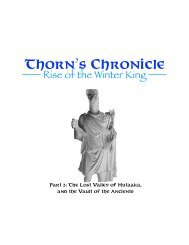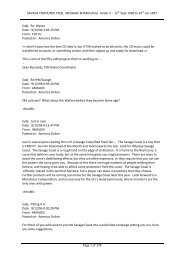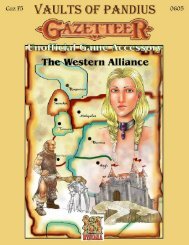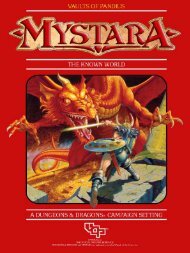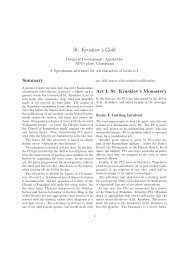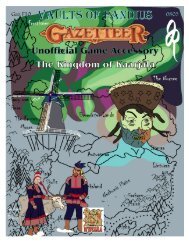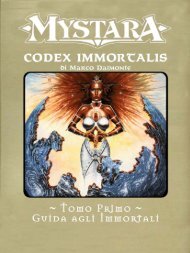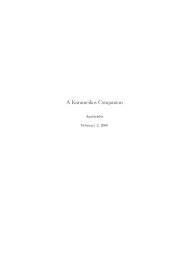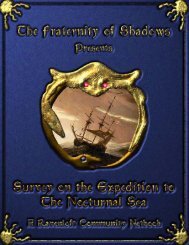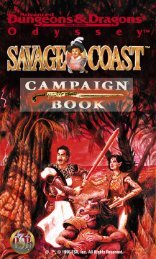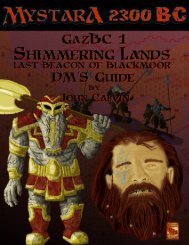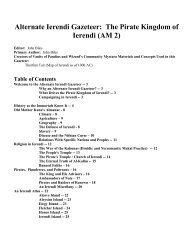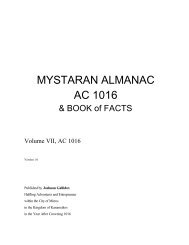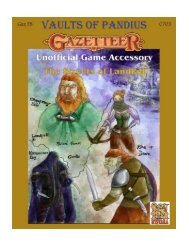The Kingdom of Littonia - Vaults of Pandius
The Kingdom of Littonia - Vaults of Pandius
The Kingdom of Littonia - Vaults of Pandius
You also want an ePaper? Increase the reach of your titles
YUMPU automatically turns print PDFs into web optimized ePapers that Google loves.
SOCIETY<br />
widely acknowledged to have the final<br />
say. Spiritual expression is a fairly<br />
simple matter, devoid <strong>of</strong> the pomp and<br />
ceremony <strong>of</strong> more cosmopolitan realms.<br />
What few rituals exist, such as marriage<br />
rites, are held in the open air.<br />
Congregation halls only exist in the<br />
largest communities.<br />
Plants and animals are accorded respect<br />
as fellow children <strong>of</strong> Zemes māte. At<br />
birth, every child is assigned a tree - an<br />
oak for boys, a linden for girls – which<br />
grows imbued with the person’s life<br />
force. It is widely believed that, should a<br />
tree be cut down, the person associated<br />
with it will die. Few <strong>Littonia</strong>ns would<br />
willingly cut down a tree associated with<br />
a deceased person for fear that its spirit<br />
would be angered. Lietuvans also <strong>of</strong>fer<br />
gifts – bread, grains, and herbs – to the<br />
earth upon a child’s birth, burying them<br />
in sacred mounds <strong>of</strong> throwing them out<br />
to sea.<br />
As bringer, purifier, and destroyer <strong>of</strong><br />
life, fire is also important, occupying a<br />
central role in many celebrations. <strong>The</strong><br />
dead are cremated in great pyres on<br />
sacred hills, along with their costliest<br />
clothing and most precious possessions.<br />
Many rural settlements have sanctuaries<br />
on hills and riverbanks where priests tend<br />
sacred fires, and traditional households<br />
always keep a fire burning in their<br />
hearths.<br />
Immortal Patrons<br />
<strong>The</strong> cast <strong>of</strong> characters in <strong>Littonia</strong>n<br />
cosmology is a product <strong>of</strong> several pre-<br />
Rain traditions that congealed during the<br />
migration <strong>of</strong> the Valoin people along the<br />
Isle <strong>of</strong> Dawn and onto the Norwold<br />
Coast. Considering the conflict between<br />
the Antalians and the Litoniesu and<br />
Lietuvans, the inclusion <strong>of</strong> Pērkons,<br />
better known as Thor, is at first puzzling.<br />
<strong>The</strong> answer lies in the legends <strong>of</strong> his<br />
battles with giants – an inspirational<br />
point for those enslaved by the giants <strong>of</strong><br />
Nordenheim. Pērkons is the only figure<br />
to have a birth or creation story – a<br />
testament to his relatively new<br />
introduction.<br />
<strong>The</strong> list below presents the most<br />
commonly revered patrons in <strong>Littonia</strong>,<br />
the Known World Immortal to whom<br />
they can be identified, and what is<br />
attributed to them. <strong>The</strong> names are<br />
presented in Litoniesu; Lietuvan<br />
equivalents are provided afterwards.<br />
Italicized names denote Immortals<br />
perceived as female in the <strong>Littonia</strong>n<br />
tradition.<br />
Immortals Attributes<br />
Jūras māte <strong>The</strong> sea, sailors,<br />
(Protius) fishermen<br />
Laima<br />
(Terra)<br />
Fate, luck, domesticity<br />
Mēness<br />
(Kagyar)<br />
<strong>The</strong> moon, war<br />
Meza māte<br />
(Ordana)<br />
Forests<br />
Mikelis Astronomy, prophecy,<br />
(Khoronus) abundance<br />
Pērkons Thunder, the sky, rain,<br />
(Thor) mountains, oak trees<br />
Saule <strong>The</strong> sun, patroness <strong>of</strong><br />
(Ixion) the unlucky<br />
Velu māte Ruler <strong>of</strong> Vinsaulē<br />
(Nyx) (“beyond the sun”),<br />
world <strong>of</strong> the dead<br />
Zemes māte<br />
(Ordana)<br />
Fertility<br />
NB: <strong>The</strong> word “māte” denotes “mother<br />
<strong>of</strong>”; thus, Jūras māte would be roughly<br />
translated as “Mother <strong>of</strong> Waves”, and<br />
Zemes māte would mean “Mother <strong>of</strong> the<br />
Soil”.<br />
In addition to the major Immortals<br />
listed above, the <strong>Littonia</strong>ns revere dozens<br />
<strong>of</strong> minor deities, many <strong>of</strong> which<br />
patronize very specific aspects <strong>of</strong> life or<br />
nature – bees, or the protection <strong>of</strong><br />
hearths, for example. Immortals, such as<br />
Ordana, can be affiliated with more than<br />
one <strong>Littonia</strong>n persona. Many <strong>of</strong> the<br />
minor deities are actually lesser aspects<br />
<strong>of</strong> the major ones.<br />
Lietuvan equivalents to the names<br />
given above, where they differ, are as<br />
follows. Again, italicized names are<br />
feminine:<br />
13<br />
Litoniesu Lietuvan<br />
Jūras māte Bangpūtys<br />
Mēness Menulis<br />
Pērkons Perkūnas<br />
Velu māte Giltine<br />
Zemes Žemyna<br />
Other Faiths and Traditions<br />
Individuals whose roots lie in the<br />
Known World tend to maintain their<br />
ancestral faiths. Most native <strong>Littonia</strong>ns,<br />
and their priests, have little contact with<br />
foreigners; thus, they are unaffected by,<br />
and pay little attention to, these new<br />
faiths. Some members <strong>of</strong> the urban<br />
classes, however, have embraced these<br />
“new” Immortals, but their numbers are<br />
still quite small.<br />
Half <strong>of</strong> the Sarkans Goblins worship<br />
the <strong>Littonia</strong>n Immortals. <strong>The</strong> remainder<br />
venerates the more traditional goblinoid<br />
deities, including Meža vīrs and Dievas;<br />
although the rites practiced are still<br />
influenced by those <strong>of</strong> their human<br />
neighbors.<br />
Societies<br />
Amber Brotherhood: <strong>The</strong> Amber<br />
Brotherhood is a two-tiered organization<br />
that views the increasing presence <strong>of</strong><br />
foreigners as an assault on traditional<br />
<strong>Littonia</strong>n values. <strong>The</strong> lower tier is the<br />
public face <strong>of</strong> the brotherhood – a quasireligious<br />
organization that stages cultural<br />
events, looks after the poor, and provides<br />
farmers with extra help when they need<br />
it.<br />
<strong>The</strong> secretive upper tier is the true<br />
organization. It employs thugs to disrupt<br />
the activities <strong>of</strong> merchants and seeks to<br />
blackmail those members <strong>of</strong> the Saiema<br />
whom it feels are betraying their nation<br />
into supporting more “favorable”<br />
proposals. Each member in the upper tier<br />
knows only the person immediately<br />
above and those immediately below them<br />
in the hierarchy, to minimize the risk that<br />
the brotherhood’s enemies can unravel<br />
the whole network.<br />
Requirements: Members <strong>of</strong> both tiers<br />
must be Litoniesu or Lietuvan, pr<strong>of</strong>ess<br />
belief in the traditional <strong>Littonia</strong>n faith,<br />
and refuse to do business with foreign



